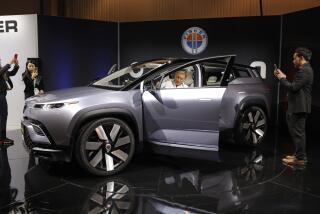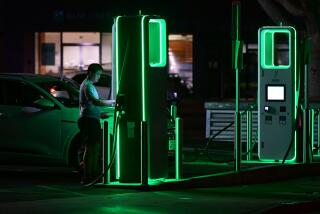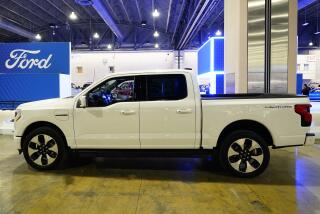Review: Fiat 500e electric vehicle is perky and fun, and it comes with an HOV lane sticker
- Share via
Despite the growing appeal of the Tesla Models S and X, and excitement about a coming 200-mile-range Chevy Bolt, plug-in electric vehicles still account for a scant fraction of U.S. auto sales.
Though March marked the biggest electric vehicle sales month in history, according to industry publication InsideEVs, those sales accounted for far less than 1% of all new vehicle sales — if you don’t count plug-in hybrids that also have gasoline engines under the hood.
So pity the poor Fiat 500e, which placed eighth on InsideEVs sales chart and had its fair share of recalls in its first couple of years.
That’s not necessarily a reflection of the electric sedan’s appeal. Still a “compliance” vehicle, manufactured and sold by Fiat Chrysler largely to meet emissions standards, the 500e is sold domestically only in Oregon and California.
And it’s actually a pretty cool car.
Like almost all electric-motor cars, the 500e is zippy and quick. With no valves, pistons, cams, flywheels or clutches to push, the battery-powered motor sends all its juice directly to the wheels.
With a claimed 111 horsepower and 147 pound-feet of torque, the 500e rips away from red lights and hops up hills with ease — and, being electric, does it silently and with no vibration.
The 500e’s chassis is short and square, so the car feels planted and nimble on the ground. It corners pretty well and doesn’t tip up on sharp turns.
On the highway, the little car still feels pretty solid, though in a tornado it would probably be one of the first things airborne. (Maybe that’s one reason the cars aren’t sold in the Midwest.)
Because it’s so small, it’s easy to park, even in spaces that would be too tight for a full-size car.
Importantly, the car comes with the coveted California HOV lane sticker, which in big population centers like Los Angeles and San Francisco is a big deal.
Around town or on the highway, it gets pretty good mileage. The EPA-estimated range on this electric is 103 miles on the highway and 121 miles around town.
Owners I’ve spoken with tell me they average about 90 miles between charges. As for me, a leadfoot who lives at the top of a series of steep hills, I seemed to be getting a little less than that. But even at the low end, a single “tank” full of electricity in the 500e easily bought me an entire week of commuting.
A full recharge requires about eight hours on a household plug, or half that long on a 240-volt system. The EPA estimates the average owner will save $6,000 in fuel costs, over five years, compared with driving the average gasoline-powered vehicle.
The 500e looks pert and perky too. The shape and color of a throat lozenge, it comes in an array of tropical tones that seem more suited to a line of kitchen appliances or frozen desserts. You can have one in Luce Blu, Celeste Blu or Electric Orange Tri-Coat Pearl. (The electric version can’t be had in the Olive Green or Modern Pearl Yellow available on other Fiat 500s.)
On the inside, the design theme is old-school minimalist. The dashboard is made of a hard plastic that shines like painted metal — just like in the Fiat 500s from the 1960s, or the VW bugs of that era. The dash is simple and uncluttered, featuring a push-button gear selector, a cluster of climate-control knobs and very little else.
The leatherette bucket seats are heated, but adjust only manually. There are very few options — a power sunroof is among them — so any upgrades to the sound system or navigation systems would be strictly aftermarket affairs.
For a small car, the 500s all offer fair legroom and headroom in the driver and passenger seats, though anyone over 6 feet 2 will have to stow the Stetson. (Maybe that’s one reason the cars aren’t sold in Texas.)
There’s considerably less space, in all dimensions, in the back seat. You could probably fit two full-size adults back there, but you might have trouble getting them out.
As for the trunk, that might cramp your style too. There’s room for your tennis togs or a picnic basket or an overnight bag. But forget about carrying the golf clubs unless your collection is limited to a single niblick or mashie.
But the trunk does contain the 500e’s 6-6kW onboard charging module, which, with the use of a Level 2 fast charger, is said to be capable of bringing the electric charge from empty to full in less than four hours.
Other aspects of the ergonomics proved challenging. I bumped into the armrest every time I plugged in the seat belt, and finally elected to fold it up and forget about it. No matter how I adjusted the seat and the steering wheel, I couldn’t see the ignition switch and had to fumble blindly with the key every time I started the car.
Fiat Chrysler has pushed the 500e with a clever ad campaign — “Single and in the fast lane,” one spot said. And the company, mindful of potential owners’ range anxiety, initially offered to throw in 10 days of free rental car use for trips longer than the car’s range. (That offer was discontinued, Fiat says, because so few people took advantage of it.)
Despite that, the electric Fiat has received some bad press, mainly because of recalls for coolant leaks, transmission issues, a faulty drive shaft and some battery pack software problems.
In fairness, those occurred early on for the 500e, a vehicle that was released in 2013 and is Fiat Chrysler’s first all-electric car.
Sales also have suffered, as all electric car sales have, from stable gas prices and from what EV boosters complain is a general indifference at the dealership level, where salespeople don’t tend to push electric cars and service departments may not be as experienced servicing them.
The plug-in electric models also are pricier than their non-electric siblings. Although the most basic gasoline-powered Fiat 500 starts at less than $18,000, the lowest 500e MSRP is $32,795. The one I tested went out the door at $34,890.
Federal and state tax incentives and other rebates take some of the sting out of that. According to Fiat, I could qualify for up to $14,000 in incentives, bringing the MSRP below $20,000. And there’s that $6,000 in gas savings. Fiat also has been offering some very aggressive lease rates in its effort to get more people into these cars.
But as one analyst told me, price isn’t the big determiner of electric vehicle sales anyway.
“The biggest selling point for EVs continues to be time because they get you into the carpool lane and you don’t have to stop at the gas station,” said Rebecca Lindland, senior analyst at Kelley Blue Book. “It’s a side benefit that you can claim you are saving the world.”
2016 Fiat 500e
Times’ take: A perky plug-in for city slickers
Highs: Quick, quiet and fun to drive
Lows: Cute, but cramped for full-size folks
Vehicle type: Two-door, four-passenger sedan
Base price: $32,795
Price as tested: $34,890
Powertrain: 83 kWh electric motor
Transmission: Single speed automatic
Horsepower: 111
Torque: 147 pound-feet
Zero to 60 mph: 9.1 seconds
EPA fuel economy rating: 121 mpg city / 103 highway / 112 combined
Recharge time: 120v 24 hours; 240v 6 hours
ALSO
Pre-orders to start for Ford GT Supercar
L.A. Drives: Galloping off to Agua Dulce in a classic Mustang GT
First Faraday cars rolling out in 2018? Not so fast, warns electric car start-up







